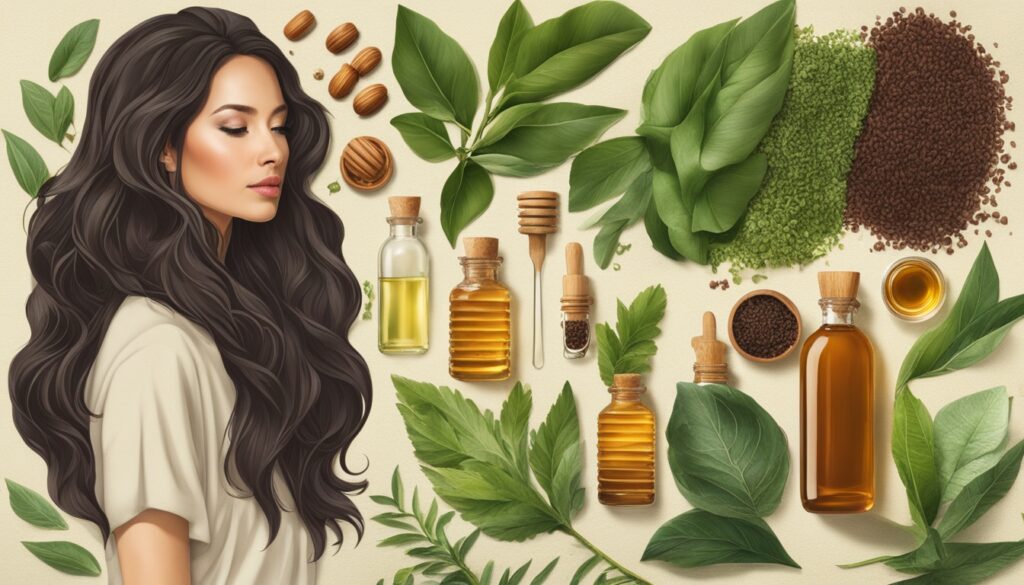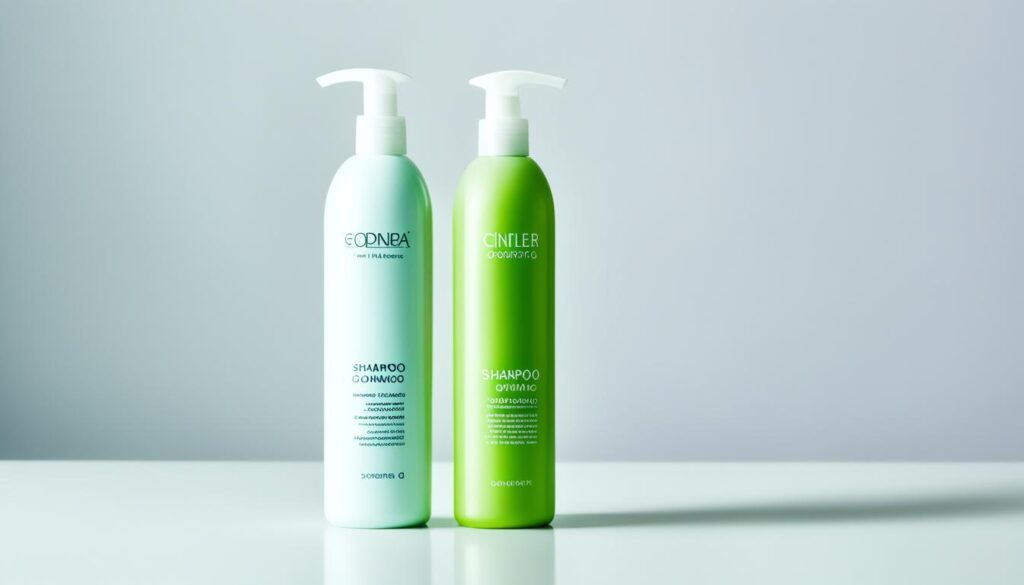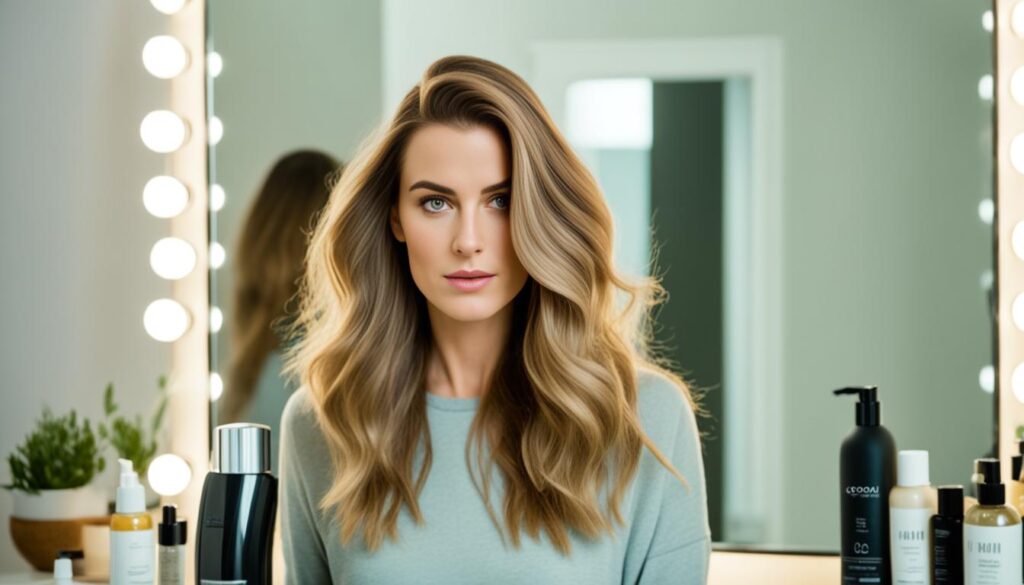A woman on social media, Harper Lee, has a unique story about her hair. In 2023, she saw her hair grow from chin to hip length, which shows how powerful natural hair care can be. This woman’s approach was simple and focused on the old ways of caring for hair, especially curly hair. She avoided modern methods like using shampoo, brushes, and non-natural products. Instead, she used natural ingredients to take care of her hair.
Look at what She did if you’re interested in natural hair care. She avoided harsh products and kept her routine simple and natural. Not getting enough protein can make your hair weak and brittle. It can also cause hair loss and make your hair lose its color. Having too little zinc can make your hair fall out more. So, it’s important to eat nuts like Brazil nuts and almonds for healthier hair. Following these natural hair care tips can help stop hair loss. They also make sure your hair stays strong and shiny.
Understanding Your Hair Type
Knowing your hair type is vital. This helps you use the correct natural hair care methods. The human scalp usually holds around 120,000 hairs. There are more strands in fine hair than in coarse types. Based on its texture, hair falls into four main categories: fine, medium, coarse, and natural spiral curls.
Fine hair is delicate, often with two layers, and can get oily. Medium hair is thicker and might have a third layer, the medulla. Thick hair includes all three layers and can resist heat better but might frizz out. And this woman found that washing and brushing her curly hair too often damaged it. So, she looked into old-fashioned and minimalistic natural remedies for hair growth.
There are 12 main hair types, from very straight (Type 1) to super curly (Type 4C). Each type has variations based on the texture and curl patterns. For example, Type 1A hair is super straight and fine and gets oily fast. Yet, Type 1B hair has more liveliness and volume. Knowing these differences helps you buy the right hair products. This includes shampoos for more volume, light conditioners, and creams that enhance curls.
This woman on social media learned that what works for straight hair, like frequent shampooing and brushing, can harm curly hair. She found a natural hair care routine that fits her hair type. The hair growth cycle has four stages: Anagen (active growth), Catagen (transition), Telogen (resting phase), and Exogen (shedding). These stages guide how you should take care of your hair.

Since Type 2A hair is wavy and either fine or medium, it needs different care than the thicker and frizz-prone Type 2B or Type 2C hair. Curly Types 3 and 4 also need unique care, including anti-frizz serums and moisturizing shampoos. Experts with over 170 years of combined knowledge say understanding your hair type is crucial for using natural hair growth methods and tailor-made hair care tips.
Harper Lee noticed that watching how her curly hair reacted to different treatments was vital for its growth. She used natural ingredients to create a hair care routine that supported growth. It’s important to figure out your hair type by looking at how thick each strand is. This means fine hair might lack volume, medium hair could sometimes frizz, and coarse hair might be naturally full of curls. Knowing this information can help you find the right natural remedies and care tips for your hair’s specific needs.
The Importance of a Balanced Diet for Hair Growth
Eating a balanced diet is vital to great hair. Hair needs proteins, vitamins, and minerals for strength, which help it look and stay healthy.
Protein-Rich Foods for Stronger Hair
Hair needs lots of protein. Getting at least 45 grams daily is essential. Lean meats and eggs are good sources of biotin, zinc, and selenium, which help keep hair healthy.
Plant proteins from beans are also significant. They contain zinc, iron, biotin, and folate. These help your hair, too.
Incorporating Zinc for Reduced Shedding
Zinc is essential to shedding less hair. Nuts, rich in vitamin E, B vitamins, and good fats, are great for this. Oysters are also good because they are a top source of zinc. They help with hair growth and repair.
| Food | Nutrient | Hair Benefits |
|---|---|---|
| Eggs | Biotin, Selenium, Protein | Promotes Optimal Hair Health |
| Nuts | Vitamin E, B Vitamins, Zinc | Prevents Hair Loss |
| Oysters | Zinc | Support Hair Growth and Repair |
| Fatty Fish | Omega-3 Fatty Acids, Proteins, Vitamins D3 and B | Promotes Healthy Hair |
| Beans | Zinc, Iron, Biotin, Folate | Promotes Hair Health |

Benefits of Omega-3 Fatty Acids
Omega-3 fatty acids are great for hair. They come from fatty fish and flax seeds. They make your scalp and hair stronger and shinier. This keeps your hair healthy and vibrant.
Remember, the right vitamins and minerals are vital for your hair. A good balance helps your hair grow strong and stay shiny.
Choosing the Right Shampoo and Conditioner
It’s best to pick the right shampoo and conditioner for healthy hair and less damage. Your hair type guides what products you need. So, choosing what matches your hair is vital.
Selecting Products Based on Hair Type
Knowing your hair type helps you pick the right shampoo and conditioner. If your scalp is oily, choose volumizing or balancing shampoos to cut oil. For dry scalps, choose shampoos that add moisture and smoothness.
Each hair type – straight, wavy, curly, or coiled – needs different care. Moisturizing shampoos help with frizz and shine. Try various shampoos and conditioners to find what works best for you.

Avoiding Harsh Ingredients
For healthy hair, avoid shampoos and conditioners with harsh ingredients like ammonium lauryl sulfate. Look for natural ingredients like lavender and almond to help hair grow. Also, choose sulfate-free products.
Choose shampoos that suit your hair, whether you wash daily or a few times a week. Ingredients like menthol and tea tree can moisturize dry scalps. That’s a good balance for caring for your hair.
The Role of Vitamins and Supplements
Knowing about vitamins and supplements is vital for good hair growth. A mix of specific vitamins helps keep your hair healthy. This can make your body better at supporting hair growth.

Essential Vitamins for Hair Growth
Many vitamins are great for making your hair grow. Vitamin A helps new cells grow. Women need 700 micrograms a day, while men need 900. B vitamins, like biotin, keep your hair strong. Without enough biotin, you might lose hair. Taking 3 to 5 milligrams of biotin daily is suggested. Vitamin C is also essential. It makes collagen, which your hair needs—lots of collagen-rich foods like strawberries, peppers, and citrus fruits.
Supplements to Consider
Supplements help when you can’t get enough from food. For example, a good multivitamin with B vitamins, zinc, and 2,000 IU of vitamin D is good for hair. Zinc is vital for healthy hair and stopping hair loss. The Neofollic tablets, packed with vitamins and minerals, cost €37.95 and are well-reviewed with 214 ratings. Omega-3 from fish and flaxseed is also good for your scalp. This makes your hair grow better, too.
Avoiding Heat Damage
Keeping your hair healthy while using heat styling needs some steps. You should know how to use heat tools wisely. This way, you keep your hair looking good and strong.
Using Heat Protectants
Heat protectants are vital for protecting hair from being too hot. They save hair from damage at over 400 degrees. The best temperature for most hot tools is between 200 and 300 degrees. Moving the tool along each hair section just once helps avoid too much damage.
Products like Dove Heat Protection Spray protect against heat and help keep hair healthy while you style it.

Alternating Between Heat Styling and Natural Hair
Changing between heat styling and natural hair looks is suitable for your hair. It gives your hair a break from the heat, letting it heal. Try hairstyles that condone heat, like braids or simple ponytails. This cuts down on heat damage and keeps your hair healthy.
Getting regular trims is also essential. It prevents split ends from forming and causing more damage. Using heat and natural styles wisely helps your hair thrive, which is a great way to prevent hair loss.
Natural Hair Growth Remedies
If you want healthier, longer hair, try natural remedies. Harper Lee SewSewing’s methods from history show this well. She used ordinary food to care for her hair, and it worked better than most products. For instance, coconut oil is amazing for the scalp and hair. A 2021 research found that it makes the scalp and hair roots healthier. It lessens protein loss in hair, making damaged hair stronger. It can be used before or after washing your hair, improving its health.
Making your hair masks at home is a great way to boost hair growth. Use ingredients like Avocado and Olive Oil or Honey with Coconut Oil. These natural products feed your hair, making it stronger and healthier. Scalp massages often also boost hair growth and keep your scalp in top condition, as a 2019 study showed.

Using essential oils can do wonders for your hair. Rosemary oil, acting like minoxidil, may help grow new hair and stop hair loss. A 2017 study praised geranium oil for promoting hair growth and blood flow. Add oil drops to your shampoo or conditioner for better hair.
Not getting enough nutrients can cause hair loss. Lack of iron, a global issue, is a big reason. Women going through changes like perimenopause or menopause are at higher risk. A zinc shortage makes hair brittle, but fixing this can help it grow back.
Omega-3 supplements, like fish oil, are suitable for your hair. A study from 2015 showed that they make hair denser and stop loss. Adding these to your diet supports a healthy scalp and thicker hair.
The Best Hairstyles for Promoting Hair Growth
Choosing the right hairstyles can boost your hair’s health and growth. It’s important to pick styles that lessen damage and shield hair from the environment. This could be through protective or low-manipulation styles.
Protective Styles to Prevent Breakage
Protective styles lower hair exposure and keep hair safe from harm. They also help keep hair long by stopping breakages and splitting ends. These styles include low buns, Dutch braids, and messy buns. Choosing these can protect hair from damage and keep it healthy.
Low-Manipulation Styles
Low-manipulation styles are also great for helping hair grow healthy. They cut down on how much you need to handle or style your hair, lessening the chances of breakage and putting less stress on your hair. Think of loose braids, twist-outs, and easy updos. These styles keep your hair intact and push growth.
Steer clear from styles that pull your hair too tight, like ponytails or buns. They stress your hair shafts, leading to breakages or possibly hair loss. Tight looks can also weaken your strands and sore your scalp.
Using protective and low-manipulation styles will do wonders for your hair. Focusing on tips for healthy hair growth shows how to promote hair growth with the right style. Your hair will get longer, stronger, and just plain better.
Tips for Healthy Hair Growth
To keep your hair healthy, follow some essential tips daily. It’s important to make sure blood circulates well to your scalp. Also, avoid hairstyles that pull on your hair too much.
Regular Scalp Massages
Regular scalp massages are a great way to help hair grow. Studies show that hair can get thicker after 24 weeks of scalp massages. Massaging boosts blood flow and the delivery of nutrients to hair roots. By doing this, you can help the hair growth cycle and possibly make your hair grow faster.
Avoiding Tight Hairstyles
Choose the right hairstyles to help your hair grow. Styles like tight braids or ponytails can damage your hair and eventually lead to hair loss because they stress the hair roots. To protect your hair, it’s best to wear extensions for no more than two to three months at a time. Try to wear looser hairstyles and switch to protective styles sometimes. This helps prevent hair breakage and loss.
Adding these practices to your daily routine can make a big difference in your health. Focus on what’s good for your scalp, and avoid things that harm your hair. This will help your hair grow well and stay strong.
The Benefits of Regular Trims
Getting your hair trimmed often is vital for its health. It stops split ends, which can lead to severe hair damage. Doing this every 4-6 weeks helps your hair stay strong and able to grow.
People with straight hair should see their stylist every 4-5 weeks. If their hair is long and healthy, they can wait eight weeks. Those with curls should cut their hair every six weeks to keep the curl shape and avoid split ends. These regular trims make their hair healthier and shinier.
If you use heat on your hair or are often outside, you may need more trims to prevent damage. It’s also important to use the right hair products, especially if you style your hair with heat or have it chemically treated.
Split ends are not your friend. If you see split ends before your next trip, they can cause your hair to frizz and become hard to manage. It’s best to trim them off early to keep damage away. Trimming your hair also fights frizz and tangles, making it easy to care for and keep in good condition.
Trimming helps your hair grow by stopping it from breaking and falling out. Keeping to a regular trim schedule will help your hair grow longer without losing its strength or shine. Knowing these tips, especially about keeping up with trims, can greatly improve the look and health of your hair.
Diy Hair Masks for Growth
DIY hair masks are great for your hair. They use natural ingredients, keeping harsh chemicals away. This natural approach helps your hair grow.
Avocado and Olive Oil Mask
A favorite DIY mask is the avocado and olive oil mix. Avocados contain lots of vitamins and fatty acids, which moisturize and strengthen hair. Olive oil adds shine and makes hair more elastic. For best results, use this mask once a week.
Honey and Coconut Oil Mask
Honey and coconut oil make another powerful mask. Honey keeps moisture in your hair, repairs damage, and boosts scalp health. Coconut oil goes deep into hair, reducing protein loss and fixing damage. This mask will make your hair shiny and strong.
The Impact of Stress on Hair Growth
Stress can seriously affect your hair, leading to loss and weaker strands. One common issue is telogen effluvium. It’s used for intense anxiety and causes up to 70% of your growing hair to switch to the resting phase. This shift causes a lot of hair to fall within three months of the stressful event and continues for about six months. Several types of hair loss, from telogen effluvium to alopecia areata, are linked to stress. Knowing how stress and hair health are connected is critical to picking the right strategies for vibrant hair.
Stress Management Techniques
It is important to handle stress well to lower your chances of hair loss. Eating well, getting enough sleep, and avoiding harmful substances are significant steps. Long-term and day-to-day stress can cause the body to release substances that harm your skin and hair. So, eating a balanced diet and sleeping enough is vital for solid hair.
Relaxation and Mindfulness Practices
Adding relaxation and mindfulness to your daily life can help your hair. Mice studies suggest that psychological stress can stop hair growth through oxidative stress. However, being mindful and meditating might slow down the aging of hair cells, enhancing hair growth. These relaxation methods not only cut stress but also boost hair health.
Hydration for Healthy Hair
Keeping your hair hydrated is vital for its health and growth. Drinking plenty of water is good for your hair and scalp. It reduces the chance of your hair breaking and boosts its overall health. Using the right products is also essential. Look for shampoos and conditioners that hydrate based on what your hair needs. They keep your hair soft, shiny, and easy to manage.
Make using these products a regular part of your daily routine to keep your hair moist and safe from harm. Deep conditioning your hair once a week is a good idea. This adds even more moisture and makes your hair stronger. It improves your health and lengthens your life. Always thinking about hydrating your hair is a crucial hair care tip. Proper moisture, both inside and out, supports good hair growth. These steps help avoid many hair problems and make your hair more robust and more lively.
Choosing Hair Accessories Wisely
Picking the right hair accessories is key to healthy, shiny hair. The wrong choices can harm hair instead of helping it look great.
Minimizing Damage from Clips and Bands
To protect your hair, choose soft clips and bands. Fabric or silicone ones are good. They lower the risk of hair breaking or getting pulled out. Research shows that gentle hair ties and scrunchies cut down on damage. Stay away from metal clips or very tight rubber bands. They cause a lot of breakage, especially during sports.
Silk and Satin Accessories
For natural hair care, go for silk and satin. These materials are kind to your hair, cutting down on breakage risks. Silk or satin caps keep your hair safer during activities or when worn for a long time. Also, they stop your hair from rubbing too much and help keep it in moisture, which are two big keys for strong, shiny hair.
Essential Oils for Hair Growth
Essential oils are a go-to for many looking to fix hair growth problems. They offer natural, effective ways to boost the health of our hair and scalp.
Benefits of Rosemary Oil
Rosemary oil doesn’t smell good, but it’s great for making hair thicker and helping it grow. A study found that it works as well as minoxidil but doesn’t cause itching. Another study showed that rosemary oil can help hair grow back on bald spots with oils like thyme and cedarwood. This proves rosemary oil is a vital part of natural hair care.
How to Use Peppermint Oil
Peppermint oil is also great for hair growth. In 2014, a study used it on mice and found it increased hair growth. It also feels fantastic on the scalp and improves blood flow, making the scalp a better place for hair to grow. Make sure to mix peppermint oil with something like coconut or jojoba oil. This helps avoid any skin irritation.
Adapting Your Hair Care Routine Seasonally
Changing your hair care routine depending on the season is key to keeping your hair healthy. This helps your hair grow well and cuts down on damage during the year. Every season has its specific tests for your hair health, so it’s essential to adjust your care routine.
Summer Hair Care Tips
Protecting your hair from the sun in summer is crucial. The sun’s rays can dry your hair, fade its color, and cause brittleness. Use products that filter UV rays and wear hats to shield your hair. It’s also essential to avoid too much chlorine in pools. Rinse your hair with fresh water after swimming and use hydrating products to prevent damage and keep it from drying out.
Use light frizz serums to combat humidity-induced frizz. Choose gentle accessories that don’t teak your hair to keep it in place. Making your own sea salt sprays can give you beach waves and texture without using heat on your hair.
Winter Hair Care Tips
Winter can be harsh on your hair, making it dry and causing it to break. The cold weather can also lead to a dry scalp. Wash your hair with mild, moisturizing shampoos to keep your scascalp’stural oils. The heating indoors can dry your hair as well. Using lightweight moisturizers is good to keep your hair from drying out.
Wearing a hat in the winter keeps you warm and protects your hair from the cold and wind, helping reduce the risk of breakage. Try to wash your hair less often to save its natural oils. Taking omega-3 supplements can fight winter dryness and improve your health. Natural oils like tea tree or coconut oil can add moisture and protection.
Changing your hair care with the seasons can boost hair growth. With these tips, your hair will stay strong and healthy throughout the year, no matter the weather.
Conclusion
Proper care and techniques are crucial for long, robust, undamaged hair. Genetics affect how your hair grows, but knowing your hair type lets you pick a hair care plan that boosts growth. For example, the number of hair follicles, usually 80,000 to 120,000 on the scalp, impacts growth and density. So, pick natural care that fits your haihair’sxture and needs.
Eating right is crucial for your hair. Make sure your diet has biotin, zinc, and omega-3. A lack of these can hurt how your hair grows and looks. It’s also important to eat proteins found in lean meats and eggs since they help with hair growth. Adding omega-3 and omega-6 to your diet can protect against hair loss, particularly if you’re experiencing female pattern baldness.
Managing stress is vital for keeping your hair healthy. Too much stress can lead to hair loss. To reduce stress, try relaxation and mindfulness every day. Scalp massages, 4 minutes daily for 24 weeks, can make your hair thicker. Also, getting regular trims, using the proper brushes, and avoiding harmful treatments help prevent damage.
Follow these tips consistently to grow healthy hair. Please choose the right products, shield your hair from heat, and keep it well-fed and moist. Understanding and caring for your hair type while watching your diet, managing stress, and using proper care steps will hugely benefit your hair goals.







